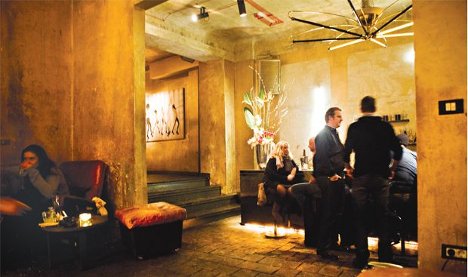In doorman we Trust
Trust Bar is the lovechild of a handsome trio: Cookie and Marcus Trojan, the owners of two of Berlin’s most famous clubs – Cookies and Weekend, respectively – and photographer Sascha Kramer. Unsurprisingly they’re keen that it remains a secret place, i.e. a place for desirable people, people you know or want to know, the typical Berlin thing. Of course the entrance is totally inconspicuous, situated on a dirty patch of Torstraße. Don’t get discouraged by the dark door. Ring the bell and peep through the hole: you’ll see the light switch on. Then wait for somebody to open the door and let you in… if you look appropriate, it goes without saying. The interior is rough meets cosy, shabby yet fancy. Imagine one of your flatmates suddenly won the lottery and put it all into a smart makeover of the WG’s living room. The walls are raw and messy, with a little gold paint in places. The light flickers, but that’s what it’s meant to do. Sit or lie down on the central futon, have a chat about life and enjoy the music. Now you’re having the ‘Trust experience’. Since single glasses are not an option here, you’ll have to trust everyone and share in that very Berlin spirit of calculatedly unpretentious exclusivity and togetherness. Go for a small bottle (2cl) of the home-brand vodka: Trust red label starts at €22 with two soft drinks, and it’s €10 more for the black-labeled variety. Or if you’re feeling decadent and rather flush, sample the champagne: a bottle of Ruinard rosé will set you back €160. Cash-strapped Trustees should stick to the soft drinks or hope for someone to be in that merry, sharing mood encouraged here, a mood that evidently extends to the bathroom concept: each individual toilet is separated by sliding doors, so bathroom buddies are free to pop over for conversation, a peak at their neighbor’s leak, or sharing of some other sort.
TRUST BAR | Torstr. 72, Mitte, U-Bhf Rosenthaler Platz, Tue-Sat from 8 pm
Get bent
Now here’s a publication by women and for women, or at least by and for women who are queer-leftist-artist-feminists, or some variation on the theme. Bend Over, the Berlin-based semi-annual journal of feminism, sexuality and queer art, just published its fifth edition and is currently available at 13 Berlin locations, as well as in major cities around the globe. The provocative publication is the work of editor Ena Schnitzlbaumer, aka dj Metzgerei, and photographer Goodyn Green. What began as Soapzine morphed into Bend Over in 2010, dropping the suds and getting a little dirtier. Highlights of recent issues include stills from the video work Community Action Center by A.K. Burns and A.L. Steiner depicting playful food-fetishists of indefinable genders; an interview by Berlin underground icon Mad Kate with photographer Nikkol Rot that feels like eavesdropping on an intimate talk between artists; and an open dialogue with readers about menstruation that describes reconnecting with your body by using a cup to collect the blood. An escapade through the often-omitted realms of female sexuality, Bend Overdoesn’t shy from blatant exposure of its themes, if at times it can feel like a tool to promote a tight group of engaged provocateurs.
BEND OVER | The Fall/Winter 2010 issue is out now. More info at www.bendovermagazine.com
Girls’ toys
Screw the quotas: real women’s empowerment starts with our right to enjoy sex at least as much as any man. For almost 10 years, La Luna has been catering to fun-seeking, sex-eager Berlinerinnen with an endless collection of sex toys, DVDs, erotic literature and magazines, raunchy lingerie and other steamy playthings. You can find a nice selection of vibrators and dildos in all price ranges (from €7.50, up to €275 at the high end), as well as manifold geisha balls (some of her best-sellers), and even bio-lubricants and edible bio-massage oils. Owner Sabine Tolksdorf is also a bit of a Prenzlauer Berg Dr. Dot, always available to answer your questions, make recommendations and educate the clueless female with her savvy and sex books. There is a very lesbian-friendly soft- and hard-core porn DVD collection, and for the true kinkettes out there, there’s a selection of fetish gear, whips and handcuffs. Women of all sexual persuasions, men and couples welcome; La Luna is the perfect neighbourly alternative to the slick, fashionista vibe of sex mega-stores like Fun Factory.
LA LUNA FRAUENEROTIKLADEN | Dunckerstr. 90, Prenzlauer Berg, U-Bhf Eberswalder Str., Tel 030 4432 8488, www.laluna-toys.de, Mon-Fri noon-8 pm, Sat noon-6pm



 Please whitelist us to continue reading.
Please whitelist us to continue reading.
Member comments